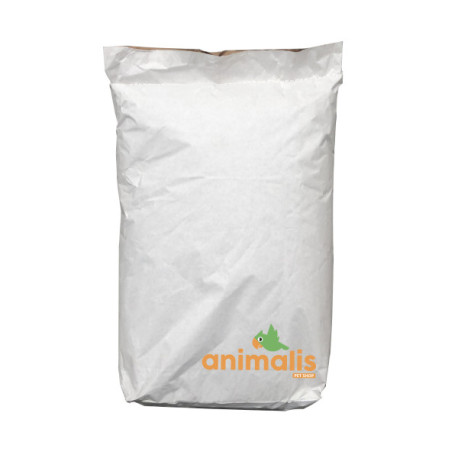- New






Reference: CAROTTE-25KG
Carrot seeds are very rich in vitamins with a high proportion of vitamin A and carotene, as well as vitamin B, calcium and valuable carbohydrates.
Carrot seeds are very rich in vitamins with a high proportion of vitamin A and carotene, as well as vitamin B, calcium and valuable carbohydrates.
Oatmeal or peeled oats are used in the composition of the basic mixtures of canaries and hooked beaks especially during the breeding and feeding period.
Its protein level is quite low, but it is a seed rich in energy.
Crude protein: 13%
Fat: 8%
Carbohydrates: 68%
Phosphorus: 0.4%
Calcium: 0.09%
Yellow millet is rich in vitamins and minerals and is an alkaline (non-acidic) cereal. It is part of the basic diet of parakeets, exotic birds and exotic doves.
Millet contains magnesium, phosphorus, iron, potassium, manganese, vitamin A, vitamin B1, vitamin B2, vitamin PP (nicotinic acid) and vitamin B5.
Niger, birdseed rich in phosphorus and calcium. Niger seeds (or nyjer seeds) are fine seeds rich in oil. They come from Guizotia abyssinica (also known as Guizotia oleiferous). The niger is highly prized by most birds, goldfinches and siskins love it.
The seed is mainly grown in India, Burma, Ethiopia and Nepal. Niger is an oilseed with a high fat content (38-43%) and protein content (23%). It provides quality food for all species of wild and forest birds, both in dry and sprouted form.
Niger is one of the few birdseeds with a good ratio of calcium to phosphorus.
Birds like to remove the shells from peanuts and then eat the peanuts. Peanuts are a source of energy, which is very important for the long winter months.
Unpeeled peanuts can be given to parrots as a treat.
They have the property of binding to minerals such as calcium, iron and zinc and making them less bioavailable.
Millet contains magnesium, phosphorus, iron, potassium, manganese, vitamin A, vitamin B1, vitamin B2, vitamin PP (nicotinic acid) and vitamin B5.
Dimensions: 20kg
This seed from switchgrass is rich in protein (12.6%) it also contains 60% carbohydrates and less than 5% fat.
It is the richest variety of millet in protein. Japanese millet is recommended to all breeders of exotics, natives, parakeets, large parakeets.
Millet is used in the diet of all birds: straight beaks and hooked beaks. In bunches, it's a treat they love.
Cluster millet has a good protein and carbohydrate content and also contains a large number of amino acids. Ideal for distracting your birds and thus avoiding pecking (feather pulling).
We advised giving red millet for exotic birds. It is richer in protein than yellow millet.
Foniopaddy Seed is a natural grass seed grown on our plantations in Uganda. Scientific research has shown that Foniopaddy has a beneficial effect on coccidiosis.
Peeled peanuts are very popular treats for parrots.
They are to be distributed sparingly because they are rich.
Ideal food to fill your wild bird dispensers, they will bring the necessary fat to the birds to spend the winter more easily.
The favorite of chickadees and a real treat for many birds.
Flaxseed is rich in omega 3, which is essential for the cardiovascular system.
Chicory seeds (cichorium intybus) are among the health seeds that come from wild plants. These seeds are rich in fiber and minerals and help maintain intestinal balance.
They purify the body and are also effective in cases of indigestion.
Seeds for canaries and exotic and native birds.
Dari, also known as sorghum or millet, is a variety of grain that is related to millet varieties. Dari is the size of a hemp seed. The grain originates from the warm regions of Australia, Asia, Africa, and South America. There are three varieties: white dari, yellow dari, and reddish-brown dari. It is noteworthy that more value is attributed to light dari than to reddish-brown dari. Regarding nutritional value, there is not the slightest difference. Furthermore, reddish-brown dari is well appreciated by lovebirds. Dari can be compared to wheat in terms of starch content. The seed has a favourable composition of amino acids. The protein present in dari has a particularly high leucine content.

Carrot seeds are very rich in vitamins with a high proportion of vitamin A and carotene, as well as vitamin B, calcium and valuable carbohydrates.
